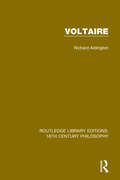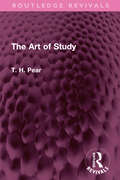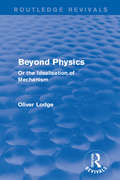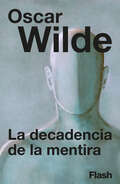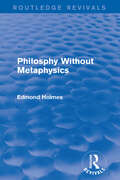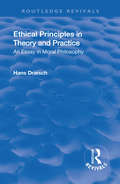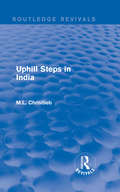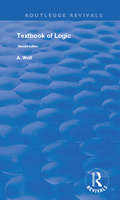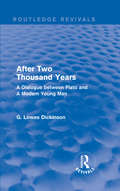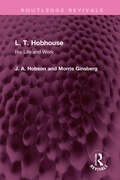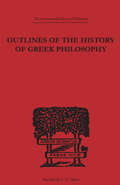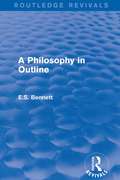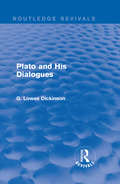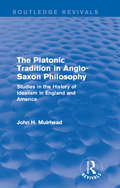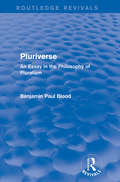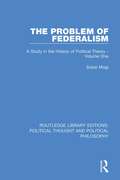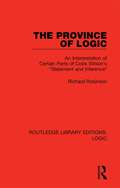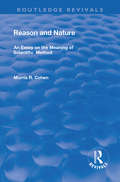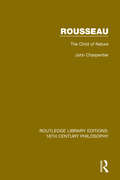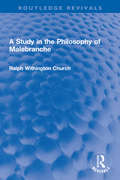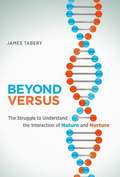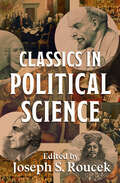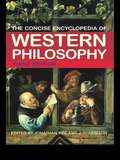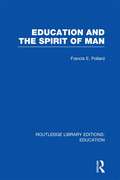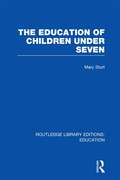- Table View
- List View
Voltaire (Routledge Library Editions: 18th Century Philosophy #17)
by Richard AldingtonThis book, first published in 1929, is an assessment of Voltaire’s life and works. It contains valuable biographical details, as well as studies of his works, philosophy, poetry, plays and literary criticism.
The Art of Study (Routledge Revivals)
by T. H. PearFirst published in 1930, The Art of Study is addressed to all who are old enough and young enough to regard the winning of knowledge as fine art. Like other arts, it can be helped by science. The book discusses reasons for the success and failure of different individuals, not omitting intelligence, stupidity, and laziness. It asks whether the memory can be trained. It contrasts the art forms of the lesson, the lecture, and the talk. It gives suggestions for increasing the student’s concentration upon work, for taking notes, and for using them afterwards. While urging the importance of hard work, it helps the student to discover parts of his tasks in which such effort will be effective.
Beyond Physics: Or the Idealisation of Mechanism (Routledge Revivals)
by Sir Oliver LodgeOriginally published in 1930, Sir Oliver Lodge proposes a connection between physics and philosophy, or as he describes it, a key to unlock the intricate connection between mind and matter. A response to early twentieth century mathematically-led philosophy, Lodge looks at physics from a physical direction rather than from a theoretical model. This title will be of interest to students of philosophy as well physics.
La decadencia de la mentira
by Oscar WildeUna defensa del arte por el arte clave para descubrir el pensamiento y la estética de Oscar Wilde. El arte ha caído en la cárcel del realismo y ha perdido toda la libertad creativa. Y, para huir de este culto a los hechos, es necesario reivindicar el papel de la mentira y el artificio en las obras. Mediante un diálogo repleto de paradojas y de la ironía característica del autor, Oscar Wilde evidencia la necesidad de escapar de toda intención moralizadora en la obra artística. Puesto que no hay nada más real que el arte, este debe existir por sí mismo y evitar ser un reflejo de una realidad que no haría más que corromperlo. «Oscar Wilde tiene el poder de transformar el ensayo en ficción.» Luis Antonio De Villen
Philosphy Without Metaphysics (Routledge Revivals)
by Edmond HolmesPhilosophy means ‘love of wisdom,’ but author Edmond Holmes fears the encroaching dominance of intellect over feeling. In this title, Holmes argues that metaphysics’ reliance on intellect and pure reason undermines the study of philosophy. Rather, Holmes suggests a return to intuitional philosophy, combining thought and feeling. First published in 1930, this title will be ideal for students interested in Philosophy and Western Civilisation.
Revival: An Essay in Moral Philosophy (Routledge Revivals)
by Hans DrieschAlmost all the existing modern systems of Ethics deal with formal definitions, and at bottom repeat more or less the same thing about them in slightly different words. In this work these are a side issue, and therefore are treated briefly. Their treatment in Section I is based upon the author’s theoretical works the Theory of Order and the Theory of Reality, but will be intelligible to those who are not acquainted with those works. The chief concern is moral teaching – that is, the practical element.
Routledge Revivals: Uphill Steps in India (1930)
by M.L. ChristliebFirst published in 1930, the author asserts that this book presents a human India ‘in all sorts of conditions and moods’. It details her first-hand experiences as a female missionary in India over the course of thirty-three years in India along with some further accounts related by eyewitnesses. It avoids proposing theories of giving abstract general pronouncements but instead focuses on the individual people with the intention that it would promote greater understanding of the nation by westerners. This book will be of interest to students of Indian, colonial and women’s history.
Textbook of Logic (Routledge Revivals)
by Wolf AbrahamOriginally published in 1930, this well-known text by the late British philosopher Abraham Wolf offers the student a practical, consistent, and comprehensive approach to logic which remains unique in its field. Dr. Wolf here deals systematically with the two main types of reasoning - formal logic and inductive logic - and their various applications. All the main elements of logic - such as inference, syllogism, dilemmas, evidence, deductive and inductive methods, and probability - are subsumed under these general headings. Professor Wolf strongly emphasizes the fact that logic cannot be mastered without some practical application; at the end of this volume, therefore, he includes a section of exercises based on each chapter. His unusally interesting appendix examines such matters as symbolic as logic, fallacies, the law of contradiction, modal propositions, the existential import of categorical propositions, predictables, and categories.
After Two Thousand Years: A Dialogue between Plato and A Modern Young Man (Routledge Revivals: Collected Works of G. Lowes Dickinson)
by G. Lowes DickinsonFirst published in 1930, this book presents an imagined account of conversation between Plato and ‘A Modern Young Man’. In the first part, political and social institutions are considered and property, forms of government, socialism, the control of population, war and education, are discussed. The second part examines the idea of real Goods including the concepts of truth, art and love. In this work, the author sees Plato reaffirming his belief that real Goods come from some higher world, which it is the destiny of the spirits to pursue.
L. T. Hobhouse: His Life and Work (Routledge Revivals)
by J. A. Hobson Morris GinsbergFirst published in 1931, L. T. Hobhouse is an amalgamation of the late social philosopher L. T. Hobhouse’s personal life and academic work. The first part of this volume is a brief biography by Mr. J. A. Hobson, with added impressions by personal friends and colleagues. It is followed by an account of his philosophy and sociology written by Professor Morris Ginsberg, his pupil and successor at the London School of Economics. Third section consists of some collected essays illustrative of his various capacities and interests. This book will be of interest to students of philosophy and sociology.
Outlines of the History of Greek Philosophy (International Library of Philosophy)
by Eduard ZellerFirst published in 2000. Routledge is an imprint of Taylor & Francis, an informa company.
A Philosophy in Outline (Routledge Revivals)
by E.S. BennettFirst published in 1931, this book provides a brief overview of the essentials of philosophy. It aims to combat the notion of the inaccessibility of philosophy by providing an introduction to its history and what the author believes to a ‘minimum dose…of incontrovertible philosophical truth’. The book merely assumes an ordinary level of adult education and offers an outline of the key areas of philosophy — consciousness, reality, experience, Life, God, love, aesthetics, conduct, logic — and as such will be of interest as a very useful starting point for anyone wishing to undertake further studies.
Plato and His Dialogues (Routledge Revivals: Collected Works of G. Lowes Dickinson)
by G. Lowes DickinsonFirst published in 1931, this book explores the nature and importance of Plato’s dialogues. The book was written for an audience of non-scholarly men and women who want to know something about one of the most remarkable thinkers of the Western world. The chapters were originally delivered as broadcast talks.
The Platonic Tradition in Anglo-Saxon Philosophy: Studies in the History of Idealism in England and America (Routledge Revivals)
by John H. MuirheadOriginally published in 1931, Muirhead’s study aims to challenge the view that Locke’s empiricism is the main philosophical thought to come out of England, suggesting that the Platonic tradition is much more prominent. These views are explored in detail in this text as well as touching on its development in the nineteenth century from Coleridge to Bradley and discussions on Transcendentalism in the United States. This title will be of interest to students of Philosophy.
Pluriverse: An Essay in the Philosophy of Pluralism (Routledge Revivals)
by Benjamin Paul BloodPluriverse, the final work of the American poet and philosopher Benjamin Paul Blood, was published posthumously in 1920. After an experience of the anaesthetic nitrous oxide during a dental operation, Blood came to the conclusion that his mind had been opened, that he had undergone a mystical experience, and that he had come to a realisation of the true nature of reality. This title is the fullest exposition of Blood’s esoteric Christian philosophy-cum-theology, which, though deemed wildly eccentric by commentators both during his lifetime and later in the twentieth century, was nonetheless one of the most influential sources for American mystical-empiricism. In particular, Blood’s thought was a major inspiration for William James, and can be seen to prefigure the latter’s concept of Sciousness directly.
The Problem of Federalism: A Study in the History of Political Theory - Volume One (Routledge Library Editions: Political Thought and Political Philosophy #42)
by Sobei MogiFirst published in 1931. The Problem of Federalism provides a comprehensive and critical survey of the historical development and practical application of the idea of federalism as a form of state organisation. The author explores federal ideas from the eighteenth- up until the early twentieth-century. This extensive study will be useful to students of politics and philosophy.
The Province of Logic: An Interpretation of Certain Parts of Cook Wilson's “Statement and Inference” (Routledge Library Editions: Logic)
by Richard RobinsonOriginally published in 1931. This inquiry investigates and develops John Cook Wilson’s view of the province of logic. It bases the study on the posthumous collected papers Statement and Inference. The author seeks to answer questions on the nature of logic using Cook Wilson’s thought. The chapters introduce and consider topics from metaphysics to grammar and from psychology to knowledge. An early conception of logic in the sciences and presenting the work of an important twentieth century philosopher, this is an engaging work.
Reason and Nature: An Essay on the Meaning of Scientific Method (Routledge Revivals)
by Morris R. CohenFirst published in 1931, this volume represents the culmination of twenty years’ of the study on the principles of science. Noticing a widespread craving for philosophical light at a time of scant such offerings, Morris R. Cohen aimed to demonstrate here the fundamental and ancient connection between nature and science - between hearts and minds – in an attempt to salve the developing mutual hostility between the two in the 1920s. The volume bears particular relation to George Santayana’s Life of Reason and Bertrand Russell’s Principles of Mathematics and explores areas including the character of the insurgence against reason and reason in the contexts of the natural and social sciences.
Rousseau: The Child of Nature (Routledge Library Editions: 18th Century Philosophy #16)
by John CharpentierThis book, first published in 1931, provides a valuable account of Rousseau’s early years, giving an insight into his later philosophies, as well as showing the development of his thought.
A Study in the Philosophy of Malebranche (Routledge Revivals)
by Ralph W. ChurchFirst published in 1931, A Study in the Philosophy of Malebranche examines the theories which constitute the philosophical system of Malebranche. From the entire gamut of Malebranche’s works, Church specifically culls out and analyses theories pertaining to Malebranche’s vision in god; knowledge; occasionalism; and imagination and sense. These theories are embedded within Malebranche’s lifelong engagement with the works of Descartes and to some extent, St. Augustine. A philosopher often overlooked, A Study in the Philosophy of Malebranche has enduring relevance for students of philosophy and theology.
Beyond Versus
by James TaberyIf everyone now agrees that human traits arise not from nature or nurture but from the interaction of nature and nurture, why does the "nature versus nurture" debate persist? In Beyond Versus, James Tabery argues that the persistence stems from a century-long struggle to understand the interaction of nature and nurture -- a struggle to define what the interaction of nature and nurture is, how it should be investigated, and what counts as evidence for it. Tabery examines past episodes in the nature versus nurture debates, offers a contemporary philosophical perspective on them, and considers the future of research on the interaction of nature and nurture. From the eugenics controversy of the 1930s and the race and IQ controversy of the 1970s to the twenty-first-century debate over the causes of depression, Tabery argues, the polarization in these discussions can be attributed to what he calls an "explanatory divide" -- a disagreement over how explanation works in science, which in turn has created two very different concepts of interaction. Drawing on recent developments in the philosophy of science, Tabery offers a way to bridge this explanatory divide and these different concepts integratively. Looking to the future, Tabery evaluates the ethical issues that surround genetic testing for genes implicated in interactions of nature and nurture, pointing to what the future does (and does not) hold for a science that continues to make headlines and raise controversy.
Classics in Political Science
by Joseph S. RoucekThis anthology collects some of the most significant writings on politics and political science from some of history&’s greatest minds. In Classics in Political Science, editor Joseph S. Roucek guides readers through the ages of political thought and theory with arguments and essays by such groundbreaking theorists as Thomas Hobbes, Nicolai Lenin, Montesquieu, Jean-Jacques Rousseau, and many others. The selections range from ancient philosophers and statesmen, such as Cicero and Aristotle, to major figures of the twentieth century, such as Gandhi and Winston Churchill.
The Concise Encyclopedia of Western Philosophy
by J. O. Urmson Jonathan RéeOn its first appearance in 1960, the Concise Encyclopedia of Western Philosophy established itself as a classic; this third edition builds on its original strengths but brings it completely up to date. The Concise Encyclopedia offers a lively, readable, comprehensive and authoritative treatment of Western philosophy as a whole, incorporating scintillating articles by many leading philosophical authors. It serves not only as a convenient reference work, but also as an engaging introduction to philosophy.
Education and the Spirit of Man (Routledge Library Editions: Education #151)
by Francis PollardThis volume was the Swarthmore Lecture for 1932, one of an annual series of lectures delivered by and for members of the Society of Friends (Quakers). The lecture discusses the place of education and moral philosophy in the world of the early twentieth century, as well as the place of religious discipline in education.
The Education of Children Under Seven (Routledge Library Editions: Education)
by Mary SturtThis book does not cover the whole field of Infants’ Teaching but is concerned mainly with general principles and matters which are open to the non-specialist. Some technical subjects such as Physical Education have been omitted but nonetheless the volume provides a thorough (if somewhat dated) introduction to early years education in the first half of the twentieth century.
